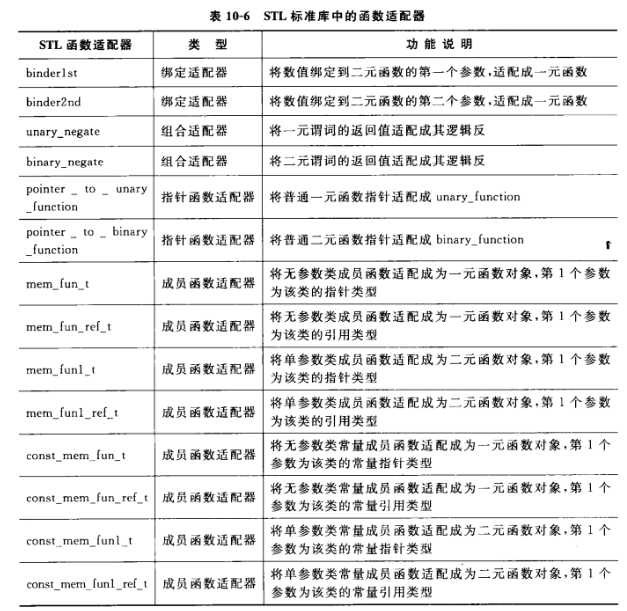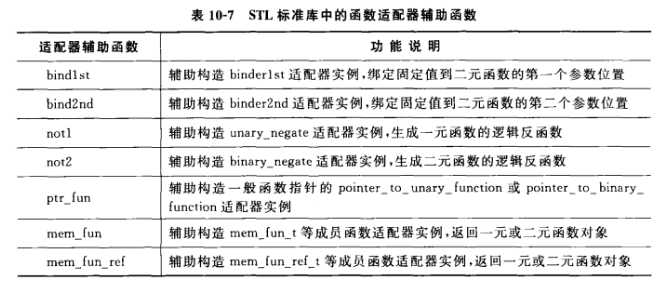标签:ted 之间 模板库 tco 成员 private 调用操作符 find 不同
重载函数调用操作符的类,其对象常称为函数对象(function object),即它们是行为类似函数的对象。一个类对象,表现出一个函数的特征,就是通过“对象名+(
参数列表)”的方式使用一个类对象,如果没有上下文,完全可以把它看作一个函数对待。
这是通过重载类的operator()来实现的。
“在标准库中,函数对象被广泛地使用以获得弹性”,标准库中的很多算法都可以使用函数对象或者函数来作为自定的回调行为;
一元函数对象:函数参数1个;
二元函数对象:函数参数2个;
谓词是一个返回bool类型的值的函数,因为函数对象是一种类型的对象,实现operator()()成员函数并返回bool类型的值,所以函数对象也是谓词。
谓词可以是一个仿函数,也可以是一个回调函数。
一元谓词 函数参数1个,函数返回值是bool类型
二元谓词 函数参数2个,函数返回值是bool类型
一元谓词函数举例如下
1,判断给出的string对象的长度是否小于6
bool GT6(const string &s)
{
return s.size() >= 6;
}
2,判断给出的int是否在3到8之间
bool Compare( int i )
{
return ( i >= 3 && i <= 8 );
}
二元谓词举例如下
1,比较两个string对象,返回一个bool值,指出第一个string是否比第二个短
bool isShorter(const string &s1, const string &s2)
{
return s1.size() < s2.size();
}
一元函数对象案例
//1普通类 重载 函数调用操作符
template <typename T>
void FuncShowElemt(T &t) //普通函数 不能像 仿函数那样记录状态
{
cout << t << " ";
};
void showChar(char &t)
{
cout << t << " ";
}
//函数模板 重载 函数调用操作符
template <typename T>
class ShowElemt
{
public:
ShowElemt()
{
n = 0;
}
void operator()(T &t)
{
n++;
cout << t << " ";
}
void printCount()
{
cout << n << endl;
}
public:
int n;
};
//1 函数对象 基本使用
void main()
{
int a = 100;
FuncShowElemt<int>(a); //普通的函数调用
ShowElemt<int> showElemt; //函数对象
showElemt(a); //函数对象调用
}
一元谓词案例
//1元谓词 例子
template <typename T>
class Isdiv
{
public:
Isdiv(const T &divisor) //
{
this->divisor = divisor;
}
bool operator()(T &t)
{
return (t%divisor == 0);
}
protected:
private:
T divisor;
};
void main()
{
vector<int> v2;
for (int i=10; i<33; i++)
{
v2.push_back(i);
}
vector<int>::iterator it;
int a = 4;
Isdiv<int> mydiv(a);
// _InIt find_if(_InIt _First, _InIt _Last, _Pr _Pred) //返回的是迭代器
it = find_if(v2.begin(), v2.end(), Isdiv<int>(4));
if (it != v2.end())
{
cout << "第一个被4整除的数是:" << *it << endl;
}
}
二元函数对象案例
template <typename T>
struct SumAdd
{
T operator()(T &t1, T &t2)
{
return t1 + t2;
}
};
template <typename T>
void printE(T &t)
{
for (vector<int>::iterator it = t.begin(); it!=t.end(); it++ )
{
cout << *it << " ";
}
}
void printVector(vector<int> &v)
{
for (vector<int>::iterator it = v.begin(); it!=v.end(); it++ )
{
cout << *it << " ";
}
}
void main()
{
vector<int> v1, v2;
vector<int> v3;
v1.push_back(1);
v1.push_back(2);
v1.push_back(3);
v2.push_back(4);
v2.push_back(5);
v2.push_back(6);
v3.resize(10);
//transform(v1.begin(), v1.end(), v2.begin(),v3.begin(), SumAdd<int>());
/*
template<class _InIt1, class _InIt2, class _OutIt, class _Fn2> inline _OutIt transform(_InIt1 _First1, _InIt1 _Last1, _InIt2 _First2, _OutIt _Dest, _Fn2 _Func)
*/
vector<int>::iterator it = transform(v1.begin(), v1.end(), v2.begin(),v3.begin(), SumAdd<int>());
cout << *it << endl;
printE(v3);
}
二元谓词案例
void current(int &v)
{
cout << v << " ";
}
bool MyCompare(const int &a, const int &b)
{
return a < b;
}
void main()
{
vector<int> v(10);
for (int i=0; i<10; i++)
{
v[i] = rand() % 100;
}
for_each(v.begin(), v.end(), current);
printf("\n"); sort(v.begin(), v.end(), MyCompare );
printf("\n");
for (int i=0; i<10; i++)
{
printf("%d ", v[i]);
}
printf("\n");
}
1)预定义函数对象基本概念:标准模板库STL提前定义了很多预定义函数对象,
#include <functional> 必须包含。
//1使用预定义函数对象:
//类模板plus<> 的实现了: 不同类型的数据进行加法运算
void main()
{
plus<int> intAdd;
int x = 10;
int y = 20;
int z = intAdd(x, y); //等价于 x + y
cout << z << endl;
plus<string> stringAdd;
string myc = stringAdd("aaa", "bbb");
cout << myc << endl;
vector<string> v1; v1.push_back("bbb");
v1.push_back("aaa");
v1.push_back("ccc");
v1.push_back("zzzz");
//缺省情况下,sort()用底层元素类型的小于操作符以升序排列容器的元素。
//为了降序,可以传递预定义的类模板greater,它调用底层元素类型的大于操作符:
cout << "sort()函数排序" << endl;;
sort(v1.begin(), v1.end(), greater<string>() ); //从大到小
for (vector<string>::iterator it=v1.begin(); it!=v1.end(); it++ )
{
cout << *it << endl;
}
}
2)算术函数对象 预定义的函数对象支持加、减、乘、除、求余和取反。调用的操作符是与type相关联的实例
加法:plus<Types>
plus<string> stringAdd;
sres = stringAdd(sva1,sva2);
减法:minus<Types>
乘法:multiplies<Types>
除法divides<Tpye>
求余:modulus<Tpye>
取反:negate<Type> negate<int> intNegate;
ires = intNegate(ires);
Ires= UnaryFunc(negate<int>(),Ival1);
3)关系函数对象
等于equal_to<Tpye>
equal_to<string> stringEqual;
sres = stringEqual(sval1,sval2);
不等于not_equal_to<Type>
大于 greater<Type>
大于等于greater_equal<Type>
小于 less<Type>
小于等于less_equal<Type>
void main()
{
vector<string> v1;
v1.push_back("bbb");
v1.push_back("aaa");
v1.push_back("ccc");
v1.push_back("zzzz");
v1.push_back("ccc");
string s1 = "ccc";
//int num = count_if(v1.begin(),v1.end(), equal_to<string>(),s1);
int num = count_if(v1.begin(),v1.end(),bind2nd(equal_to<string>(), s1));
cout << num << endl;
}
4)逻辑函数对象
逻辑与 logical_and<Type>
logical_and<int> indAnd;
ires = intAnd(ival1,ival2);
dres=BinaryFunc( logical_and<double>(),dval1,dval2);
逻辑或logical_or<Type>
逻辑非logical_not<Type>
logical_not<int> IntNot;
Ires = IntNot(ival1);
Dres=UnaryFunc( logical_not<double>,dval1);
C++中有三类适配器,分别是容器适配器,迭代器适配器和函数适配器,这里主要介绍函数适配器。
1)函数适配器的理论知识




2)常用函数函数适配器
标准库提供一组函数适配器,用来特殊化或者扩展一元和二元函数对象。
常用适配器是:
1绑定器(binder): binder通过把二元函数对象的一个实参绑定到一个特殊的值上,将其转换成一元函数对象。C++标准库提供两种预定义的binder适配器:bind1st和bind2nd,前者把值绑定到二元函数对象的第一个实参上,后者绑定在第二个实参上。
2取反器(negator) : negator是一个将函数对象的值翻转的函数适配器。
标准库提供两个预定义的ngeator适配器:
not1翻转一元预定义函数对象的真值,而not2翻转二元谓词函数的真值。
常用函数适配器列表如下:
bind1st(op, value)
bind2nd(op, value)
not1(op)
not2(op)
mem_fun_ref(op)
mem_fun(op)
ptr_fun(op)
3)常用函数适配器案例
//////////////////////////////////////////////////////////////////////////
class IsGreat
{
public:
IsGreat(int i)
{
m_num = i;
}
bool operator()(int &num)
{
if (num > m_num)
{
return true;
}
return false;
}
protected:
private:
int m_num;
};
void main()
{
vector<int> v1;
for (int i=0; i<5; i++)
{
v1.push_back(i+1);
}
for (vector<int>::iterator it = v1.begin(); it!=v1.end(); it ++)
{
cout << *it << " "
}
int num1 = count(v1.begin(), v1.end(), 3);
cout << "num1:" << num1 << endl;
//通过谓词求大于2的个数
int num2 = count_if(v1.begin(), v1.end(), IsGreat(2));
cout << "num2:" << num2 << endl;
//通过预定义函数对象求大于2的个数 greater<int>() 有2个参数
// param > 2
int num3 = count_if(v1.begin(), v1.end(), bind2nd(greater<int>(), 2 ) );
cout << "num3:" << num3 << endl;
//取模 能被2整除的数 求奇数
int num4 = count_if(v1.begin(), v1.end(), bind2nd(modulus <int>(), 2 ) );
cout << "奇数num4:" << num4 << endl;
int num5 = count_if(v1.begin(), v1.end(), not1( bind2nd(modulus <int>(), 2 ) ) );
cout << "偶数num5:" << num5 << endl;
return
}
标签:ted 之间 模板库 tco 成员 private 调用操作符 find 不同
原文地址:http://www.cnblogs.com/lsgxeva/p/7792675.html